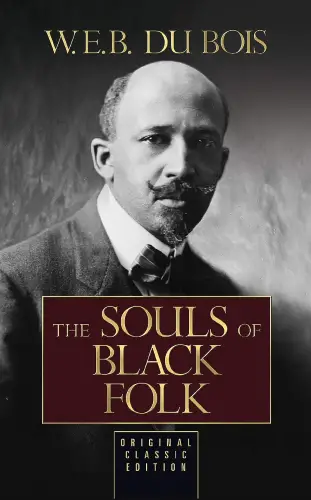The Souls of Black Folk
Book Author: W. E. B. Du Bois
Summary reviewed by:
Terrence Timmons
Terrence Timmons
Analyst
Bachelor of Arts (BA), University Of California, Santa Barbara 2019
With over 4 years of experience as an analyst. Terrence Timmons is committed to analyzing summaries without compromising on quality.
The Souls of Black Folk: Summary
"The Souls of Black Folk" by W. E. B. Du Bois is a searing exploration of African American life at the turn of the 20th century, unmasking the veil between races in America.
This seminal work, not part of a series but a standalone masterpiece, unfolds across the Southern United States, predominantly in the post-Reconstruction era. Du Bois introduces the concept of "double consciousness," a psychological challenge for African Americans, grappling with their African heritage and American citizenship. Through a collection of essays, Du Bois blends history, sociology, music, and religion to illuminate the struggle for equality and identity.
He critiques the obstacles imposed by both Jim Crow laws and the ideologies of more conservative Black leaders of the time, advocating for the right to vote, civil rights, and higher education for African Americans. The book resonates with poignant narratives and spirituals that underscore the enduring hope and despair of the Black experience. Du Bois’s eloquent prose provides a powerful lens through which the reader perceives the African American community's aspirations and challenges. "The Souls of Black Folk" is not just a book; it is a profound societal commentary, a beacon that continues to illuminate the intricacies of race relations and human dignity.
Spoilers (watch a short ad to reveal spoilers)
The Souls of Black Folk: Genres
Non-fiction
African American Literature
Sociology
History
Political Science
Essays
The Souls of Black Folk: Themes
Double Consciousness: The Souls of Black Folk introduces the idea of double consciousness, a term Du Bois uses to describe the internal conflict African Americans face in maintaining their African heritage while navigating a world dominated by whites. The text explores the struggles and aspirations of black individuals seeking to reconcile these two identities.
Racial Equality: Du Bois ardently advocates for racial equality, highlighting the systemic injustices that African Americans endure. He criticizes the policies and institutions that perpetuate racial inequality, such as Jim Crow laws and the denial of the right to vote.
Education: The book emphasizes the importance of education for African Americans. Du Bois critiques the Atlanta Compromise, an agreement that undermined black intellectual progress, advocating instead for a comprehensive education that nurtures the mind, body, and soul.
Cultural and Historical Exploration: Du Bois explores the rich cultural and historical tapestry of African Americans, delving into their traditions, music (notably the sorrow songs), and historical experiences, underscoring their significant contributions to American society.
The Souls of Black Folk: Methodology
In the spirit of W. E. B. Du Bois, our summary of "The Souls of Black Folk" was shaped by expert analysis, synthesizing content, and an unwavering commitment to quality and integrity. Our seasoned reviewers delve deeply into Du Bois's narrative, extracting pivotal themes such as the struggle for identity and equality, and presenting them with clear, engaging prose. We ensure each word reflects the book's essence, maintaining the integrity of Du Bois’s vision. Our aim is to offer a window into the book's soul, providing a summary that is not only informative but also a catalyst for deeper understanding and reflection.


The Souls of Black Folk
Date Published: 1903
Disclaimer: As an Amazon Associate I earn from qualifying purchases.




